Farmers in European countries that helped Ukraine fume as it floods market with cheap grains
Sign up now: Get ST's newsletters delivered to your inbox
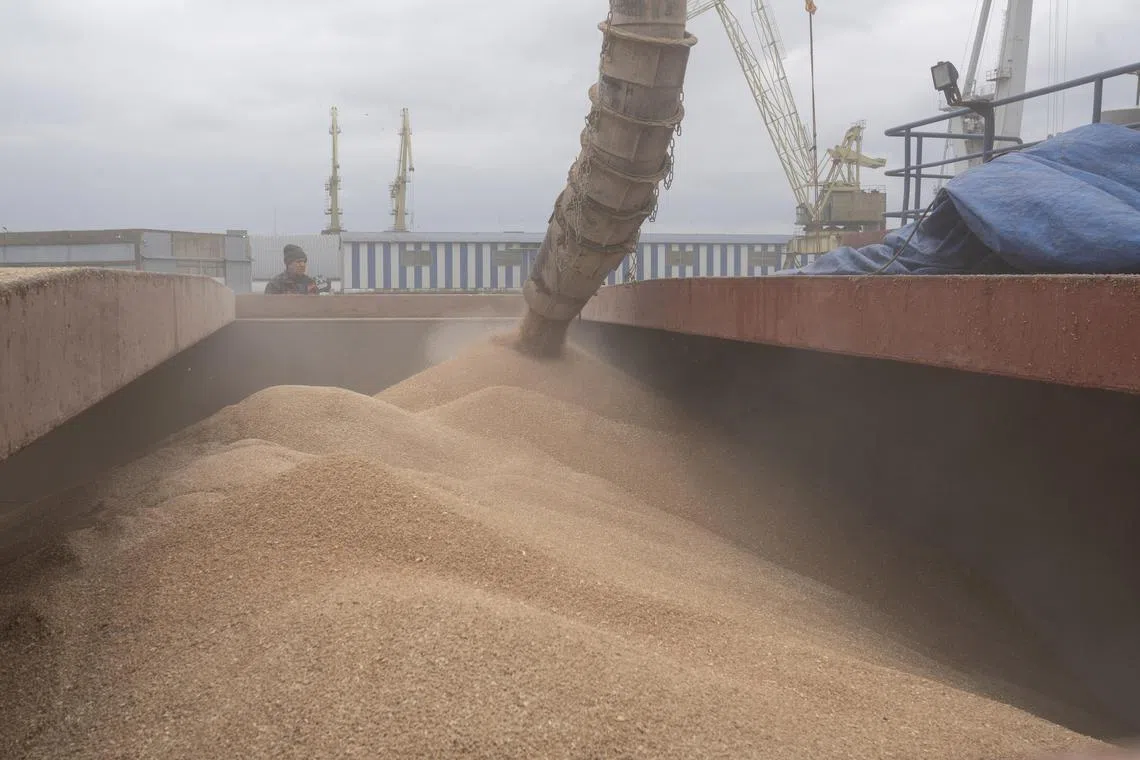
Prices have been driven so low that selling would mean earning less than producing crops.
PHOTO: NYTIMES
GALATI COUNTY, Romania – After more than a year of surprisingly solid European unity in support of Ukraine, grains of discord are piling up in the barn of Mr Robert Vieru, a Romanian farmer with 500 tonnes of wheat and 250 tonnes of sunflower seeds now sitting unsold because of cut-price Ukrainian competition.
A glut of Ukrainian cereals and other produce has nearly halved the value for the results of Mr Vieru’s labours.
It has also left farmers across eastern and central Europe – and their governments, most of which face elections this year or next – caught between solidarity with Ukraine and their own survival.
“I feel sad for them but my heart breaks for myself,” Mr Vieru said of Ukrainians living across the nearby border in Romania’s Danube River delta, as he opened the sliding door of a concrete barn, filled to the brim with last year’s unsold harvest.
Prices have been driven so low by a flood of cheap food from Ukraine, he said, that selling would mean earning less than he paid to produce his crops.
Mr Vieru’s plight, shared by farmers in Poland, Hungary, Slovakia and Bulgaria, flow from the unintended consequences of good intentions gone awry.
Market forces, turbocharged by profiteering, have turned an ambitious effort by the European Union to help Ukraine export its harvest and ease what the United Nations described last year as an “unprecedented global hunger crisis” into a source of political division and economic distress in Europe’s formerly communist eastern lands.
The mess has not erased strong public support for Ukraine, at least not yet.
But it has created an opening for far-right groups that favour Russia, generated serious frictions within the European bloc and soured moods in a region that had been a bastion of mostly unflagging support for Ukraine.
A proposal from the European Commission of €100 million (S$147 million) to compensate farmers has done little to assuage the tensions.
With the exception of Hungary, whose populist prime minister, Mr Viktor Orban, has often cosied up to Russia, the countries hit hardest by the competition are among Ukraine’s most stalwart European allies. Poland, Romania and Slovakia have provided weapons and military training.
Over the past week, however, all five countries have imposed tight restrictions on importing Ukrainian grain.
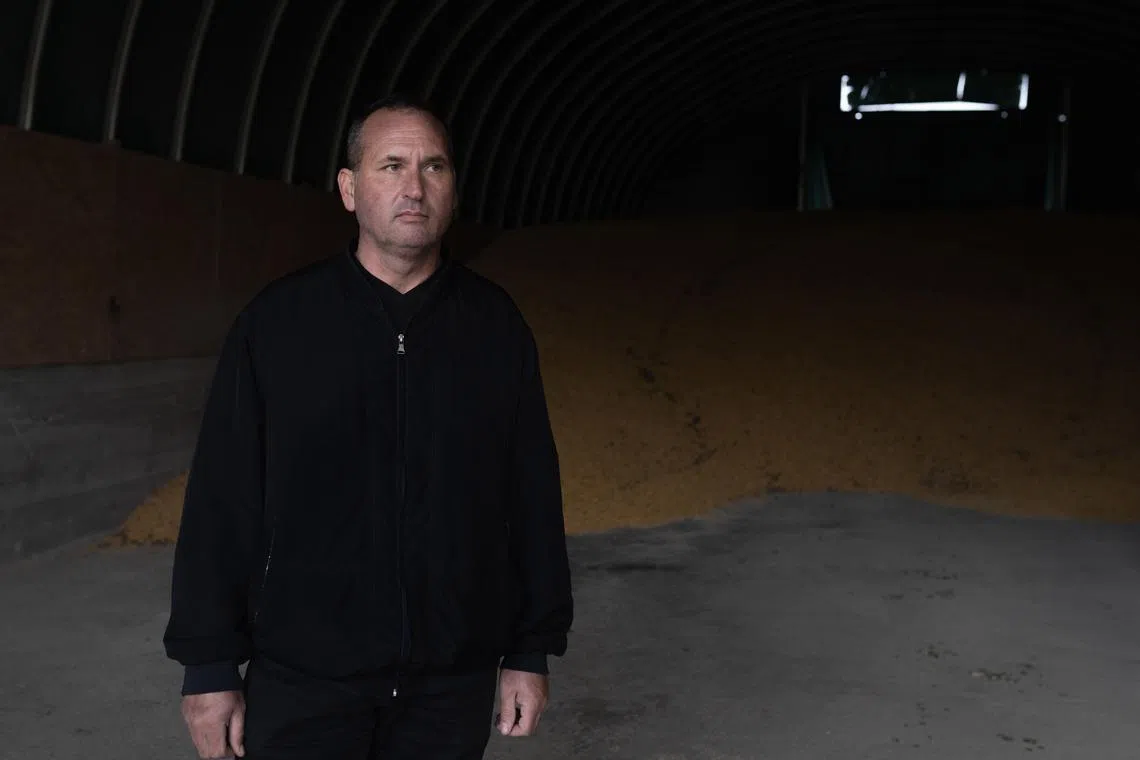
Mr Robert Vieru, a Romanian farmer with hundreds of tonnes of grains sitting unsold because of cheaper Ukrainian food.
PHOTO: NYTIMES
Only Romania has stopped short of an outright ban.
“We are the last man standing,” Romanian Transport Minister Sorin Grindeanu said in an interview.
Moscow has threatened to not renew its own Black Sea grain deal
On Monday, Russian Foreign Minister Sergei Lavrov met UN Secretary-General Antonio Guterres to discuss that deal, which expires on May 18.
When the European bloc announced in June that it was lifting tariffs and other barriers on Ukrainian farm products, the move was welcomed as a bold response to Russia’s blockade and bombardment of Ukraine’s main ports on the Black and Azov Seas.
The disruption had raised fears that, cut off from Ukraine’s bread basket, countries in Africa, the Middle East and parts of Asia might starve.
To bypass blocked sea routes, Europe devised an elaborate programme to create alternative pathways from Ukraine involving roads, Danube Delta barges and trains.
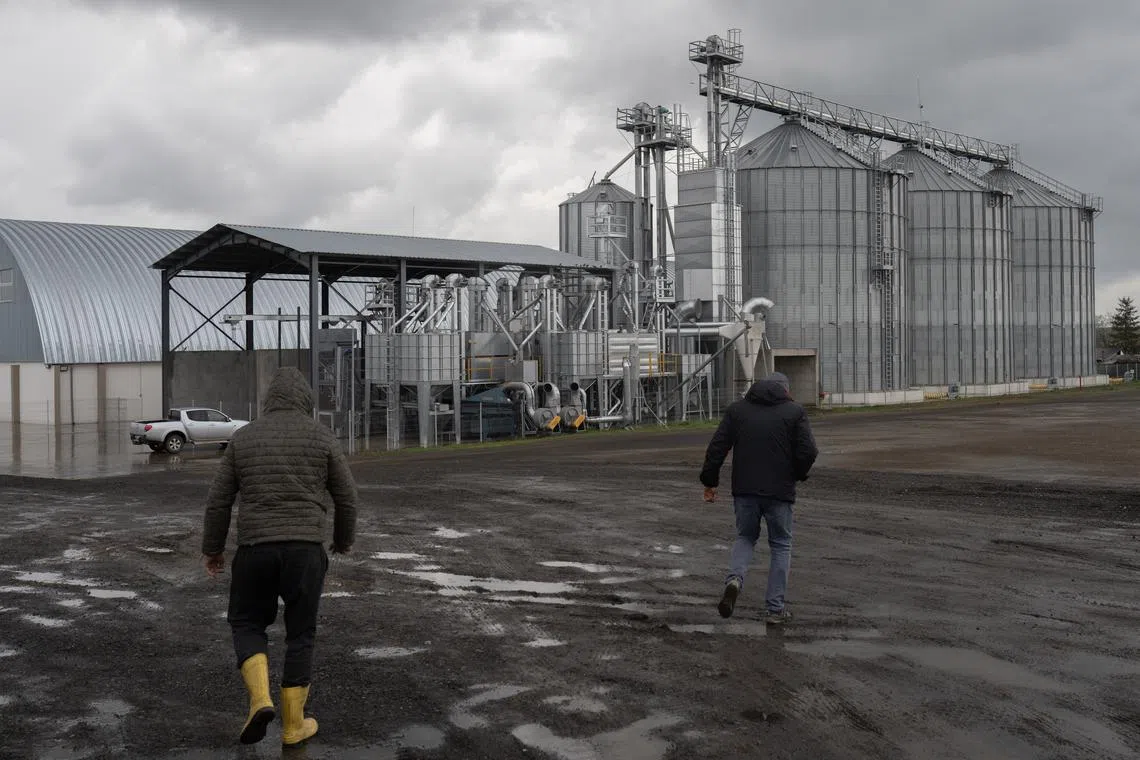
Farmworkers head toward warehouses filled with cereals at a Dorin Group farm in Rediu, Romania, on April 20.
PHOTO: NYTIMES
The plan largely worked. It helped get millions of tonnes of Ukrainian grain onto the global market, easing prices and averting hunger in other countries.
But the flood of Ukrainian foodstuffs into nearby countries such as Romania, itself a major grain producer, hammered local farmers.
They found themselves squeezed out of transport hubs and unable to compete with supplies from Ukraine, free of the costly restrictions and quality-control demands imposed by the EU.
“We can’t compete at these prices. Nobody can compete,” said Mr Bogdan Dediu, owner of a family farm in Galati County on the Danube. “Of course, we want to help Ukraine. But we also have families and children to support.”
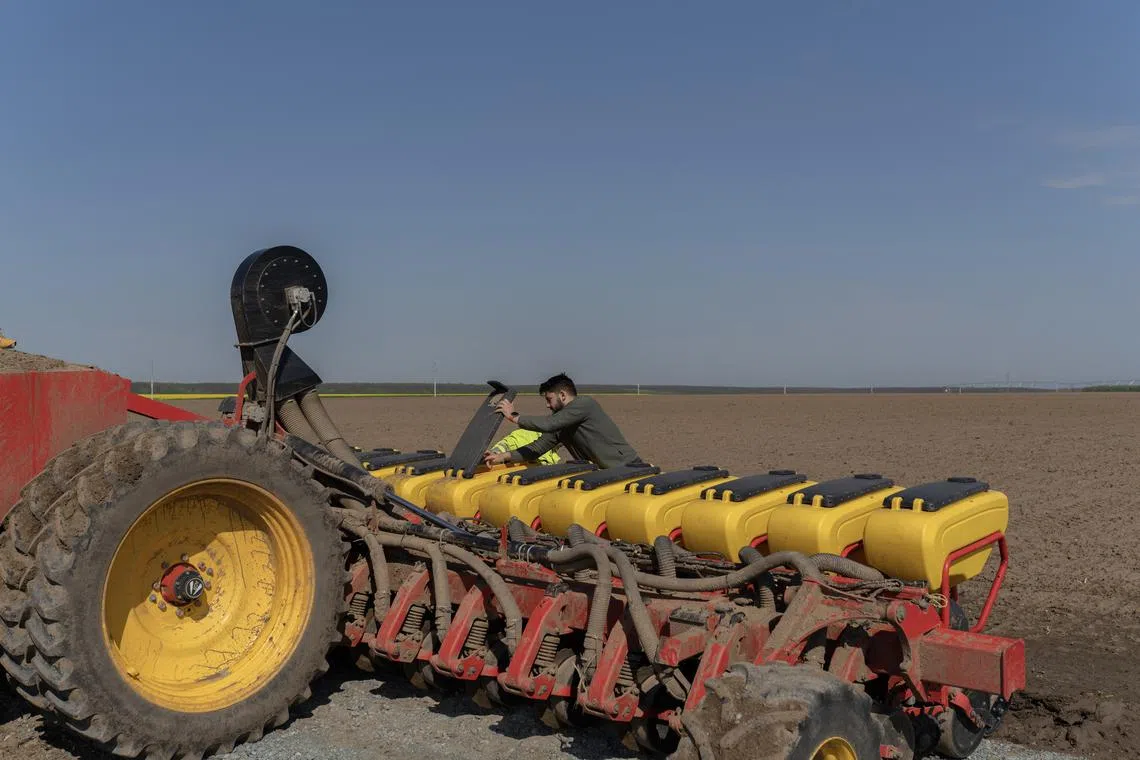
A farmer prepares a planter for sowing corn near Prundu, Romania, on April 24.
PHOTO: NYTIMES
Unlike Mr Vieru, he sold his crops soon after last year’s harvest – just before prices spiralled downwards – but still sees himself “as collateral damage of the war”.
While prices fell, transport and other costs rose as Ukrainian grain poured into the main river port for the Galati County farming region. Shipments of Ukrainian grain last year through Galati port increased more than 90 times compared with 2021.
The port had rarely handled Ukrainian grain until the EU put €2 million into repairing a long-disused, wide-gauge railway so that trains from Ukraine and Moldova, which use different tracks, could transport grain directly.
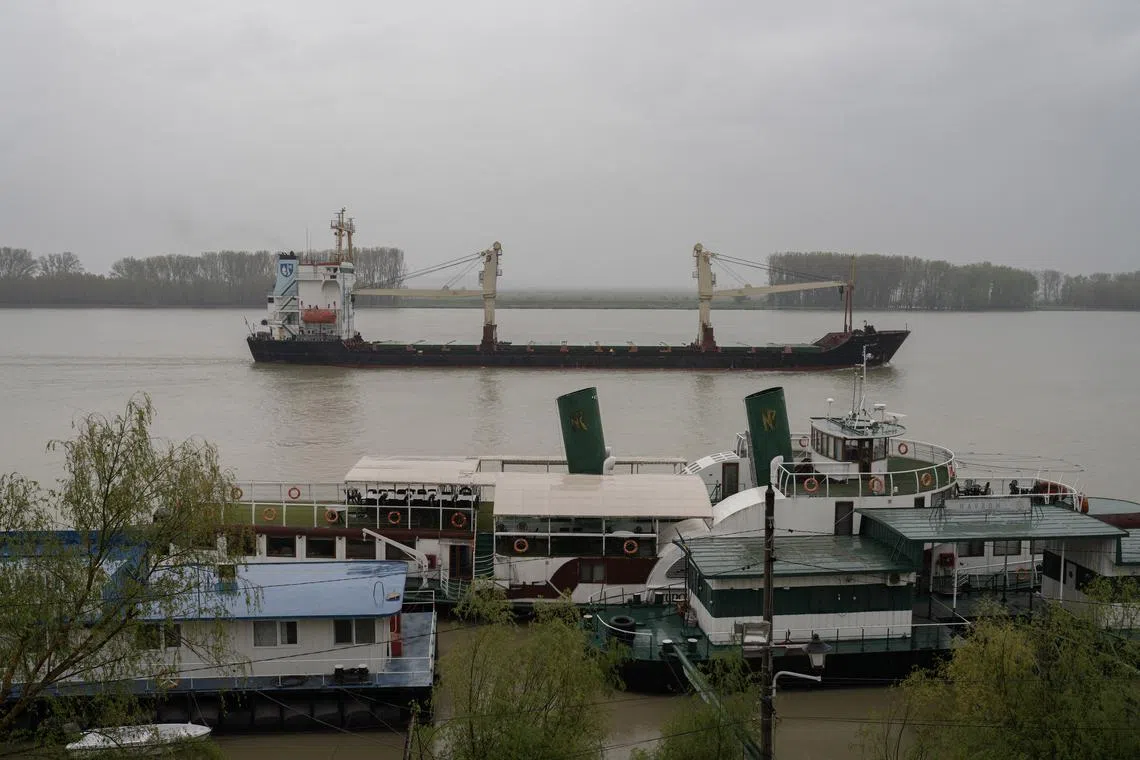
The port had rarely handled grain until the EU put 2 million euros into repairing a railway to transport grain directly.
PHOTO: NYTIMES
From there, most of the grain was supposed to be moved by barge through inland waterways to the Black Sea port of Constanta for shipment to Africa and elsewhere.
Much of it seeped into Romania’s domestic market.
Ms Marcela-Daniela Costea, director of Galati river port, said large amounts of grain had been stored for weeks and even months by traders in dockside silos controlled by outside companies. “I have no idea what happened to it,” she said.
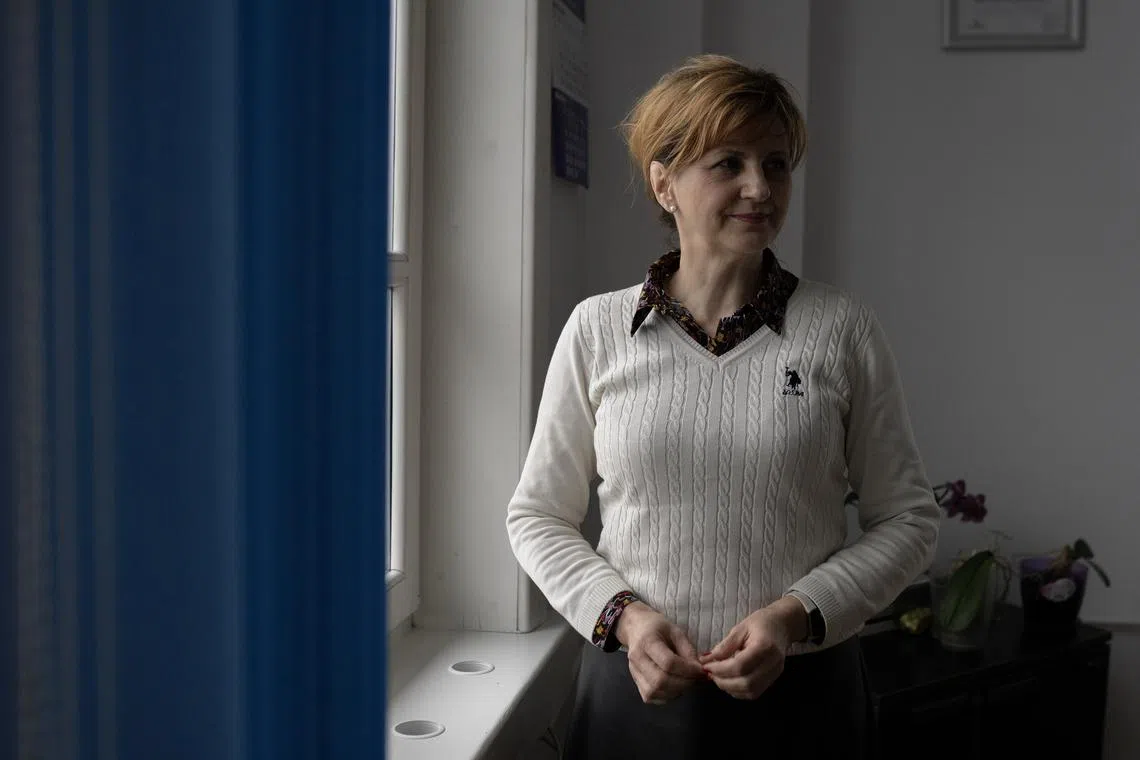
Ms Marcela-Daniela Costea, the director of the port of Galati, said large amounts of grain had been stored for weeks.
PHOTO: NYTIMES
Mr Florin Ciolacu, executive director of the Romanian Farmers’ Club, a lobbying group, said his country’s farmers had lost €3.5 billion since February 2022 because of low prices and the higher costs of production and transport.
Of the EU’s efforts to help Ukraine, he said: “The intentions were good but the results were very bad.”
As much as half of the grain designated for transit through Romania under the European programme, he noted, had stayed in the country.
By selling Ukrainian grain locally, traders also added to their profits by avoiding shipping costs and long waits at overloaded ports.
Mr Vieru cursed traders’ pursuit of profit for ruining his business.
At the same time, he said he could not really blame them: “If I have honey on my fingers, I, of course, lick them,” he said, using a Romanian phrase describing irresistible temptation. NYTIMES


